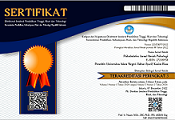Tren Penelitian Surrender to God: Tinjauan Bibliometrik 2014-2024
Abstract
Sikap berserah diri kepada Tuhan (surrender to God) merupakan salah satu bentuk religious coping yang telah banyak diteliti dalam konteks kesehatan mental dan kesejahteraan psikologis. Meskipun sempat dianggap sebagai bentuk penghindaran masalah oleh sebagian praktisi kesehatan mental, tren penelitian dalam satu dekade terakhir menunjukkan peningkatan minat terhadap pendekatan religius dalam mengelola stres, konflik, dan penyakit. Studi ini menganalisis tren publikasi ilmiah bertema surrender to God selama periode 2014–2024 menggunakan pendekatan bibliometrik. Data diperoleh dari basis data Scopus menggunakan kata kunci: surrender to God, religious coping, religious adjustment, dan spiritual well-being. Setelah dilakukan pembatasan pada jenis dokumen, bidang keilmuan, dan bahasa, diperoleh 514 artikel relevan. Analisis menggunakan VOSviewer menunjukkan bahwa tema utama berkembang mencakup spiritualitas, religiusitas, dan kesehatan mental, serta subtema seperti resilience, well-being, dan spiritual care. Dalam konteks Islam, konsep surrender to God selaras dengan nilai tawakal, yakni sikap berserah diri yang aktif, penuh usaha, dan kepercayaan terhadap kehendak Tuhan. Tawakal berpotensi menjadi strategi adaptif dalam mengatasi tekanan psikologis sekaligus membangun ketahanan spiritual. Oleh karena itu, penelitian ini mengusulkan terminologi Islamic surrender sebagai kontribusi khas Islam dalam rangka memperkaya kerangka religious coping dalam psikologi dan ilmu sosial.
Keywords
Full Text:
PDFReferences
AbdAleati, N. S., Mohd Zaharim, N., & Mydin, Y. O. (2016). Religiousness and Mental Health: Systematic Review Study. Journal of Religion and Health, 55(6), 1929–1937. https://doi.org/10.1007/s10943-014-9896-1
Abu-Raiya, H., & Pargament, K. I. (2015). Religious coping among diverse religions: Commonalities and divergences. Psychology of Religion and Spirituality, 7(1), 24–33. https://doi.org/10.1037/a0037652
Adil, Dr. A., Gondal, Shah, F., & Shujja, Dr. S. (2024). Tawakkul and its Dimensions: A Thematic Analysis of Quranic Verses on Tawakkul. VFAST Transactions on Islamic Research, 12(1), 82–101. https://doi.org/10.21015/vfast-tir.v12i1.1799
Aggarwal, S., Wright, J., Morgan, A., Patton, G., & Reavley, N. (2023). Religiosity and spirituality in the prevention and management of depression and anxiety in young people: A systematic review and meta-analysis. BMC Psychiatry, 23(1), 729. https://doi.org/10.1186/s12888-023-05091-2
Akhtar, S., Dolan, A., & Barlow, J. (2017). Understanding the Relationship Between State Forgiveness and Psychological Wellbeing: A Qualitative Study. Journal of Religion and Health, 56(2), 450–463. Scopus. https://doi.org/10.1007/s10943-016-0188-9
Al-Ghazali, I., & Ihya ’Ulum al-Din. (1998). Mengembangkan Ilmu-Ilmu Agama (Jilid I ed). Pustaka Nasional Pte Ltd.
Arrey, A. E., Bilsen, J., Lacor, P., & Deschepper, R. (2016). Spirituality/Religiosity: A Cultural and Psychological Resource among Sub-Saharan African Migrant Women with HIV/AIDS in Belgium. PLOS ONE, 11(7), e0159488. https://doi.org/10.1371/journal.pone.0159488
Cavaliere, P. (2021). Building Emotional Resilience: Japanese Women’s Religious and Spiritual Coping Strategies in the Time of COVID-19. Religions, 12(9), 723. https://doi.org/10.3390/rel12090723
Cha, K. M., Kang, S. Y., Hyun, S. Y., Noh, J. S., Shin, Y. M., & Kim, N. H. (2019). Mediating effect of interpersonal coping on meaning in spirituality and quality of life and the influences of depression and anxiety thereon in cancer patients. Palliative and Supportive Care, 17(4), 388–395. https://doi.org/10.1017/S1478951518000731
Clements, A. D., & Ermakova, A. V. (2012). Surrender to God and stress: A possible link between religiosity and health. Psychology of Religion and Spirituality, 4(2), 93–107. https://doi.org/10.1037/a0025109
Clements, A. D., Fletcher, T. R., Childress, L. D., Montgomery, R. A., & Bailey, B. A. (2016). Social support, religious commitment, and depressive symptoms in pregnant and postpartum women. Journal of Reproductive and Infant Psychology, 34(3), 247–259. https://doi.org/10.1080/02646838.2016.1152626
Davis, L. Z., Cuneo, M., Thaker, P. H., Goodheart, M. J., Bender, D., & Lutgendorf, S. K. (2018). Changes in spiritual well-being and psychological outcomes in ovarian cancer survivors. Psycho-Oncology, 27(2), 477–483. https://doi.org/10.1002/pon.4485
De Voogd, X., Oosterveld-Vlug, M., Torensma, M., Onwuteaka-Philipsen, B., Willems, D., & Suurmond, J. (2020). A dignified last phase of life for patients with a migration background: A qualitative study. Palliative Medicine, 34(10), 1385–1392. https://doi.org/10.1177/0269216320948708
Dolcos, F., Hohl, K., Hu, Y., & Dolcos, S. (2021). Religiosity and Resilience: Cognitive Reappraisal and Coping Self-Efficacy Mediate the Link between Religious Coping and Well-Being. Journal of Religion and Health, 60(4), 2892–2905. https://doi.org/10.1007/s10943-020-01160-y
Dzikra, O. C., Umayah, U., Meidyansyah, R., Zubaidah, Z., Adam, Y., & Iloakasia, A. J. (2025). Islamic Spirituality based Self-guidance Model for Managing Stress among Working College Students. Al-Musyrif: Jurnal Bimbingan Dan Konseling Islam, 8(1), 90–104. https://doi.org/10.38073/almusyrif.v8i1.2502
Fitriani, A., Talitha, A. S., Riady, S. A., & Nashori, F. (2024). Tawakal dan Resiliensi Akademik Dalam Setting Blended Learning Pada Mahasiswa Muslim Di Yogyakarta. Psychopolytan : Jurnal Psikologi, 8(1), 34–43. https://doi.org/10.36341/psi.v8i1.4102
Frederick, T., & White, K. M. (2015). Mindfulness, Christian Devotion Meditation, surrender, and worry. Mental Health, Religion and Culture, 18(10), 850–858. https://doi.org/10.1080/13674676.2015.1107892
Hall, M. E. L., Lee, G. E., McMartin, J., Abernethy, A., Shannonhouse, L., Park, C. L., Aten, J., Kapic, K., & Silverman, E. J. (2024). Spiritual Surrender: Initial Appraisals of Cancer Diagnoses in Black Christian Women. Journal of Black Psychology, 50(3), 365–387. https://doi.org/10.1177/00957984241232942
Huda, M. (2023). Self-control and tawakal on quarter-life crisis in students of Islamic boarding school. Journal of Indonesian Psychological Science, 3(1), 284–297.
I. Pargament, K., & Abu Raiya, H. (2007). A DECADE OF RESEARCH ON THE PSYCHOLOGY OF RELIGION AND COPING: Things we assumed and lessons we learned. Psyke & Logos, 28(2), 25. https://doi.org/10.7146/pl.v28i2.8398
Imam al-Ghazali. (2019). Terjemah Ihya’ Ulumiddin 9 (1). In Al-Ihya Ulumiddin.
Isdianto, A., & Fitrianti, N. (2025). OPTIMIZING INCISION DEPTH IN SUNNAH CUPPING THERAPY FOR SAFETY AND THERAPEUTIC EFFICACY. Multidisciplinary Indonesian Center Journal (MICJO), 2(2), 1527–1537. https://doi.org/10.62567/micjo.v2i2.685
Javaid, Z. K., Ijaz, S., Latif, E., & Azam, S. (n.d.). A QUALITATIVE STUDY ON STUDENT-TEACHER INTERACTION: STUDENT ENGAGEMENT AND TEACHER FEEDBACK.
Kirby, S. E., Coleman, P. G., & Daley, D. (2004). Spirituality and Well-Being in Frail and Nonfrail Older Adults. Journals of Gerontology - Series B Psychological Sciences and Social Sciences, 59(3), 123–129. https://doi.org/10.1093/geronb/59.3.P123
Li, P. F. J., Wong, Y. J., McDermott, R. C., Cheng, H. L., & Ruser, J. B. (2021). U.S. college students’ lay beliefs about hope: A mixed-methods study. Journal of Positive Psychology, 16(2), 249–262. https://doi.org/10.1080/17439760.2019.1689420
Liefbroer, A. I., Wierstra, I. R., Janssen, D. J. A., Kruizinga, R., Nagel, I., Olsman, E., & Körver, J. W. G. (2022). A spiritual care intervention for chaplains in home-based palliative care: Design of a mixed-methods study investigating effects on patients’ spiritual wellbeing. Journal of Health Care Chaplaincy, 28(3), 328–341. https://doi.org/10.1080/08854726.2021.1894532
Liem, A. (2020). “Doing My Profession is also Part of Worship”: How Clinical Psychologists Address Aspects of Spirituality and Religion in Indonesia. Journal of Religion and Health, 59(3), 1434–1457. https://doi.org/10.1007/s10943-019-00880-0
MacKinlay, E., Burns, R., & Mordike, M. S. (2024). The lived experience of frailty: What does it mean to be frail? Journal of Religion, Spirituality and Aging, 36(3), 269–292. https://doi.org/10.1080/15528030.2023.2223156
MahdiNejad, J. e. D., Azemati, H., & Sadeghi Habibabad, A. (2020). Explaining an Influential Model of the Significant Relationship Between Religion, Spirituality, and Environmental Peace in Mosque Interior Architecture. Journal of Religion and Health, 59(4), 2149–2162. https://doi.org/10.1007/s10943-020-00983-z
Malek, J. A., Hasan, A. Z., Rahman, A. Z., Khairuddin, W. H., Arif, R., Awang, J., & Yunus, R. M. (2022). Elements of internal, external factors of mental health disorders, tawakal and resilience in COVID 19 pandemic. International Journal of Health Sciences, 6401–6416. https://doi.org/10.53730/ijhs.v6nS6.11333
Manning, L., Ferris, M., Narvaez Rosario, C., Prues, M., & Bouchard, L. (2019). Spiritual resilience: Understanding the protection and promotion of well-being in the later life. Journal of Religion, Spirituality & Aging, 31(2), 168–186. https://doi.org/10.1080/15528030.2018.1532859
Mcdonald, A., & Gorsuch, R. L. (2000). Surrender to God: An Additional Coping Style? Journal of Psychology and Theology, 28(2), 149–161. https://doi.org/10.1177/009164710002800207
Merluzzi, T. V., Salamanca-Balen, N., Philip, E. J., & Salsman, J. M. (2023). “Letting go” - Relinquishing control of illness outcomes to God and quality of life: Meaning/peace as a mediating mechanism in religious coping with cancer. Social Science & Medicine, 317, 115597. https://doi.org/10.1016/j.socscimed.2022.115597
Mitha, K. (2020). Conceptualising and addressing mental disorders amongst Muslim communities: Approaches from the Islamic Golden Age. Transcultural Psychiatry, 57(6), 763–774. https://doi.org/10.1177/1363461520962603
Nissen, R. D., Viftrup, D. T., & Hvidt, N. C. (2021). The Process of Spiritual Care. Frontiers in Psychology, 12, 674453. https://doi.org/10.3389/fpsyg.2021.674453
Okan, N., Şahin, Y., Genç, H., & Demirhan, M. (2025). Harnessing spiritual coping to foster resilience: Insights from post-trauma mental health after the Kahramanmaraş earthquake. Humanities and Social Sciences Communications, 12(1). https://doi.org/10.1057/s41599-025-05318-5
Paiva, B. S. R., Carvalho, A. L., Lucchetti, G., Barroso, E. M., & Paiva, C. E. (2015). “Oh, yeah, I’m getting closer to god”: Spirituality and religiousness of family caregivers of cancer patients undergoing palliative care. Supportive Care in Cancer, 23(8), 2383–2389. https://doi.org/10.1007/s00520-015-2604-1
Pargament, K., & Abu Raiya, H. (2007). A DECADE OF RESEARCH ON THE PSYCHOLOGY OF RELIGION AND COPING: Things we assumed and lessons we learned. Psyke & Logos, 28(2), 25. https://doi.org/10.7146/pl.v28i2.8398
Peteet, J. R. (2019). Approaching Religiously Reinforced Mental Health Stigma: A Conceptual Framework. Psychiatric Services, 70(9), 846–848. https://doi.org/10.1176/appi.ps.201900005
Peteet, J. R., Zaben, F. Al, & Koenig, H. G. (2019). Integrating spirituality into the care of older adults. International Psychogeriatrics, 31(1), 31–38. https://doi.org/10.1017/S1041610218000716
Reis, L. A. D., & Menezes, T. M. D. O. (2017). Religiosity and spirituality as resilience strategies among long-living older adults in their daily lives. Revista Brasileira de Enfermagem, 70(4), 761–766. https://doi.org/10.1590/0034-7167-2016-0630
Reynolds, K. J., Turner, J. C., Branscombe, N. R., Mavor, K. I., Bizumic, B., & Subašić, E. (2010). Interactionism in Personality and Social Psychology: An integrated Approach to Understanding the Mind and Behaviour. European Journal of Personality, 24(5), 458–482. https://doi.org/10.1002/per.782
Rosmarin, D. H., Kaufman, C. C., Ford, S. F., Keshava, P., Drury, M., Minns, S., Marmarosh, C., Chowdhury, A., & Sacchet, M. D. (2022). The neuroscience of spirituality, religion, and mental health: A systematic review and synthesis. Journal of Psychiatric Research, 156, 100–113. https://doi.org/10.1016/j.jpsychires.2022.10.003
Safran, J. D. (2016). Agency, surrender, and grace in psychoanalysis. Psychoanalytic Psychology, 33(1), 58–72. https://doi.org/10.1037/a0038020
Sari, N. P. W. P. (2019). Spiritual wellbeing in breast and cervical cancer survivors: Differences in each stage of survivorship. International Journal of Public Health Science, 8(4), 438–451. https://doi.org/10.11591/ijphs.v8i4.20311
Schulz, E. (2020). Perceived wellbeing as related to spirituality and stress management: A case study of the purna health management system. Journal of Positive Psychology and Wellbeing, 4(1), 1–14.
Sebastian, A. T., Rajkumar, E., John, R., Daniel, M., George, A. J., Greeshma, R., & James, T. (2022). Emotional Self-Care: Exploring the Influencing Factors Among Individuals With Cancer. Frontiers in Psychology, 13. https://doi.org/10.3389/fpsyg.2022.898345
Seesink, H.-J., Van Dusseldorp, M., Ostafin, B. D., Schaap-Jonker, H., & Wiers, R. W. (2025). Psychometric Properties of the Dutch Surrender to God Scale: Relationships with Religious Behavior, God Representation, Well-being, and Health. Journal of Religion and Health, 64(2), 1399–1418. https://doi.org/10.1007/s10943-024-02144-y
Sekely, A., Xie, Y., Makani, A., Brown, T., & Zakzanis, K. K. (2020). Spiritual Well-Being as a Predictor of Emotional Impairment Following Mild Traumatic Brain Injury. Journal of Clinical Psychology in Medical Settings, 27(4), 859–866. https://doi.org/10.1007/s10880-019-09687-3
Shannonhouse, L., McMartin, J., Sacco, S. J., Hall, M. E. L., Park, C. L., Kim, D., Silverman, E., Kapic, K., & Aten, J. (2024). Spiritual surrender: Measurement of an emic Christian religious coping strategy. Spirituality in Clinical Practice, 11(2), 173–185. https://doi.org/10.1037/scp0000314
Shroff, D. M., Breaux, R., & Von Suchodoletz, A. (2023). Understanding the association between spirituality and mental health outcomes in adolescents in two non-Western countries: Exploring self-control as a potential mediator. Development and Psychopathology, 35(3), 1434–1443. https://doi.org/10.1017/S0954579421001334
Surzykiewicz, J., Skalski, S. B., Niesiobędzka, M., & Konaszewski, K. (2022). Exploring the mediating effects of negative and positive religious coping between resilience and mental well-being. Frontiers in Behavioral Neuroscience, 16, 954382. https://doi.org/10.3389/fnbeh.2022.954382
Weber, S. R., & Pargament, K. I. (2014). The role of religion and spirituality in mental health: Current Opinion in Psychiatry, 27(5), 358–363. https://doi.org/10.1097/YCO.0000000000000080
Yeh, P.-M., Moxham, L., Patterson, C., Antoniou, C., & Liou, J.-C. (2023). A Comparison of Psychological Well-Being, Coping Strategies, and Emotional Problems Between Taiwanese and Australian Nursing Students. Journal of Nursing Research, 31(2), e264. https://doi.org/10.1097/jnr.0000000000000543
DOI: http://dx.doi.org/10.24014/pib.v6i3.37911
Refbacks
- There are currently no refbacks.
Redaksi Psikobuletin: Buletin Ilmiah Psikologi
Publisher: Universitas Islam Negeri Sultan Syarif Kasim Riau
Jl. H.R. Soebrantas Km. 15.5 No. 155 Gedung Fakultas Psikologi UIN Sultan Syarif Kasim Riau Kel. Tuahmadani Kec. Tampan Pekanbaru - Riau 28293.
E-mail : psikobuletin@uin-suska.ac.id / Website :http://ejournal.uin-suska.ac.id/index.php/Psikobuletin
Psikobuletin : Buletin Ilmiah Psikologi by Fakultas Psikologi is licensed under a Creative Commons Attribution 4.0 International License.



31.png)





